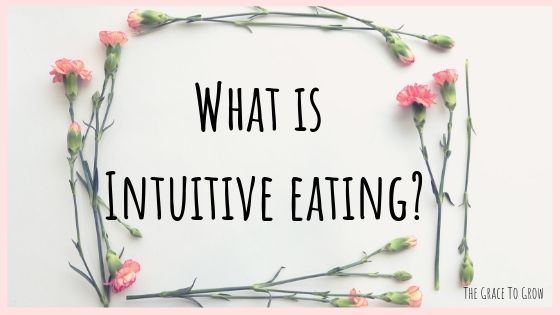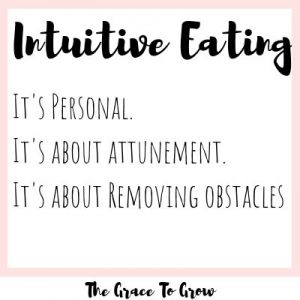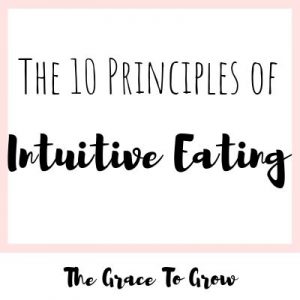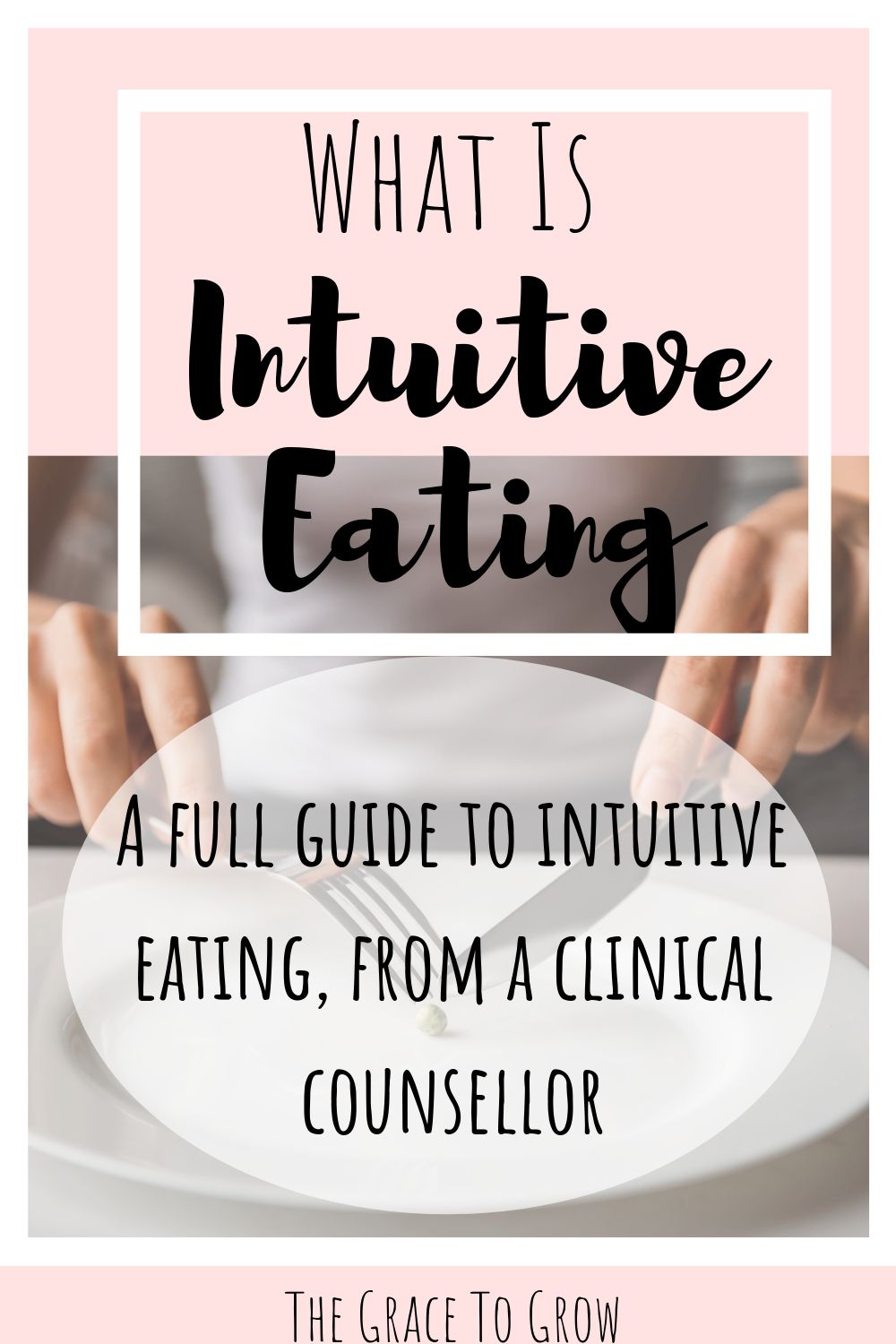
What is intuitive eating? This is a question that I wanted to unpack for the members of my Facebook group, but I knew I needed to call in a true expert to do the topic justice. So that is what I did! Morgan van Vliet is a clinical counselor who specializes in eating disorders, and has a special interest in intuitive eating. Morgan was kind enough to do a guest blog post for us, so that as we ask, “what is intuitive eating” we will have a great resource on this topic!
Perhaps you’re interested in intuitive eating, or you’re looking at how to eat intuitively after an eating disorder. In this post, Morgan gave us her best intuitive eating tips and knowledge. In addition to this, she provided us with a 5-day intuitive eating challenge in our Facebook group. Find it here!
THIS POST PROBABLY CONTAINS AFFILIATE LINKS. IF YOU WANT TO READ THE FULL DISCLOSURE POLICY, CLICK HERE.
Intuitive Eating Book and Intuitive Eating Workbook
What is Intuitive Eating?
Thanks to all of you who listened to the live chat Cecily and I did on Intuitive Eating! While there are many definitions of Intuitive Eating out there, my favorite one is as follows: Intuitive Eating is a personal journey of health that pays attention to the messages of your body and meets your emotional and physical needs. So, what is intuitive eating? Lets unpack this a bit:
First, it’s personal. Unlike many mainstream diets, Intuitive Eating is really about putting YOU back in the drivers seat of your eating. How can anyone else possibly know how hungry you are, and what amount and types of food it will take for you to feel satisfied?
This is the big problem with regimented meal plans, as they essentially put someone else (even if that ‘someone else’ is the internet) in charge of deciding how much you can/should eat and what you can/should eat.
Second, it’s about helping you gain attunement (that is, to hear and respond) to the messages of your body. These include messages such as your hunger and fullness levels, as well as messages surrounding the types of food your body wants to eat. This can also include ‘movement cravings’ (they body’s way of telling you it wants some exercise).

Third, it’s about removing the obstacles to attunement so that you can more easily discern what your physical and emotional needs are. For example, It’s hard to be attuned to your physical and emotional needs when your quality of self-care is low.
Intuitive Eating is a process that helps you remove some of the obstacles blocking your ability to hear what your body and emotions are saying.
The 10 Principles of Intuitive Eating
Evelyn Tribole and Elyse Resch are the authors of the book ‘Intuitive Eating’ and they have laid out the 10 principles as follows:
1. Reject the Diet Mentality.
Throw out the diet books and magazine articles that offer you false hope of losing weight quickly, easily, and permanently.
Get angry at the lies that have led you to feel as if you were a failure every time a new diet stopped working and you gained back all of the weight. If you allow even one small hope to linger that a new and better diet might be lurking around the corner, it will prevent you from being free to rediscover Intuitive Eating.
2. Honor Your Hunger.
Keep your body biologically fed with adequate energy and carbohydrates. Otherwise you can trigger a primal drive to overeat.
Once you reach the moment of excessive hunger, all intentions of moderate, conscious eating are fleeting and irrelevant. Learning to honor this first biological signal sets the stage for re-building trust with yourself and food.
3. Make Peace with Food.
Call a truce, stop the food fight!
Give yourself unconditional permission to eat. If you tell yourself that you can’t or shouldn’t have a particular food, it can lead to intense feelings of deprivation that build into uncontrollable cravings and, often, bingeing. When you finally “give-in” to your “forbidden food,” eating will be experienced with such intensity, it usually results in “Last Supper overeating,” and overwhelming guilt.

4. Challenge the Food Police.
Scream a loud “NO” to thoughts in your head that declare you’re “good” for eating under 1000 calories or “bad” because you ate a piece of chocolate cake.
The “Food Police” monitor the unreasonable rules that dieting has created. The police station is housed deep in your psyche, and its loud speaker shouts negative barbs, hopeless phrases, and guilt-provoking indictments. Chasing the Food Police away is a critical step in returning to Intuitive Eating.
5. Respect Your Fullness.
Listen for the body signals that tell you that you are no longer hungry. Observe the signs that show that you’re comfortably full. Pause in the middle of a meal or food and ask yourself how the food tastes, and what is your current fullness level?
6. Discover the Satisfaction Factor.
The Japanese have the wisdom to promote pleasure as one of their goals of healthy living In our fury to be thin and healthy, we often overlook one of the most basic gifts of existence–the pleasure and satisfaction that can be found in the eating experience. When you eat what you really want, in an environment that is inviting and conducive, the pleasure you derive will be a powerful force in helping you feel satisfied and content. By providing this experience for yourself, you will find that it takes much less food to decide you’ve had “enough”.
7. Honor Your Feelings Without Using Food.
Find ways to comfort ,nurture, distract, and resolve your issues without using food. Anxiety, loneliness, boredom, anger are emotions we all experience throughout life. Each has its own trigger, and each has its own appeasement. Food won’t fix any of these feelings. It may comfort for the short term, distract from the pain, or even numb you into a food hangover. But food won’t solve the problem. If anything, eating for an emotional hunger will only make you feel worse in the long run. You’ll ultimately have to deal with the source of the emotion, as well as the discomfort of overeating.
8. Respect Your Body.
Accept your genetic blueprint. Just as a person with a shoe size of eight would not expect to realistically squeeze into a size six, it is equally as futile (and uncomfortable) to have the same expectation with body size. But mostly, respect your body, so you can feel better about who you are. It’s hard to reject the diet mentality if you are unrealistic and overly critical about your body shape.
9. Exercise–Feel the Difference.
Forget militant exercise. Just get active and feel the difference. Shift your focus to how it feels to move your body, rather than the calorie burning effect of exercise. If you focus on how you feel from working out, such as energized, it can make the difference between rolling out of bed for a brisk morning walk or hitting the snooze alarm. If when you wake up, your only goal is to lose weight, it’s usually not a motivating factor in that moment of time.
10. Honor Your Health–Gentle Nutrition.
Make food choices that honor your health and taste-buds while making you feel well. Remember that you don’t have to eat a perfect diet to be healthy. You will not suddenly get a nutrient deficiency or gain weight from one snack, one meal, or one day of eating. It’s what you eat consistently over time that matters, progress, not perfection is what counts.
What is Intuitive Eating – Conclusion
If these principles resonate with you and you are interested in pursuing Intuitive Eating for yourself, then get your own copy of the book and workbook. Also, if podcasts are your thing then take a listen here: https://christyharrison.
Would you like to be a part of this Facebook group where you have access to a new health expert every week? You can join us by clicking here!
Get a free “Get Your Priorities Straight” worksheet when you fill in your information below!







Leave a Comment